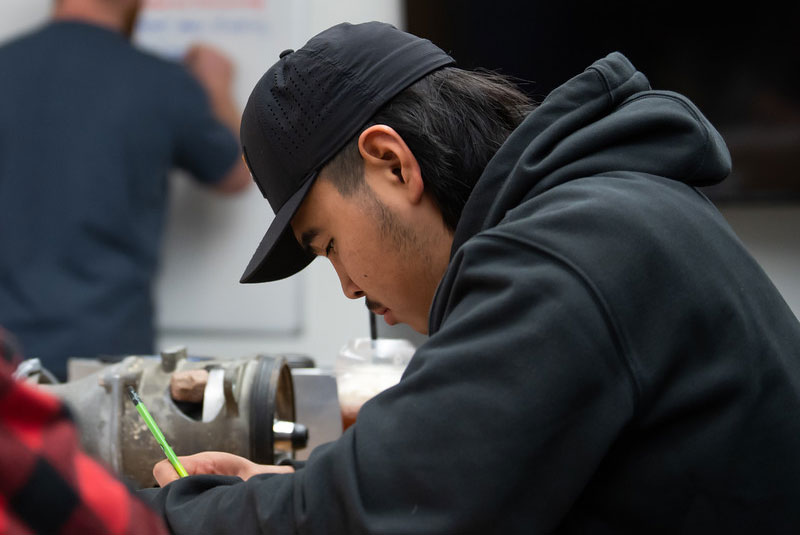Hands-On Impact: PWSC Graduate Joins Copper River Watershed Team
by V Heisser |
Rosel Burt, a recent graduate of Prince William Sound College, earned Occupational Endorsement Certificates (OEC) in Natural Resources Technician and Marine Natural Resources Technician in May. These programs provide students with the technical skills, hands-on training, and professional knowledge needed for employment as technicians in natural resources and marine science. Students gain valuable experience by working alongside content experts, developing communication and teamwork skills, and connecting directly with natural resource management organizations—helping them transition smoothly from training to career.
This summer, Rosel put those skills to work as an employee of the Alaska Center for Conservation Science (ACCS). Their project, funded by the U.S. Fish and Wildlife Service, focused on plant management and data collection in the Copper River Basin and Valdez. While ACCS spearheaded the project, Rosel collaborated with the Copper River Watershed Project (CRWP) on shared fieldwork and outreach efforts. To learn more about the broader importance of this work, we spoke with Amanda Jackson, Watershed Stewardship Program Manager at CRWP.
Q: Can you describe the specific projects or activities your team, including Rosel,
has been working on this summer in the Copper Basin?
A: “Rosel assisted our technicians with surveying, monitoring, and controlling invasive
plant species, including bird vetch, white sweetclover, orange hawkweed, narrowleaf
hawksbeard, and foxtail barley,” Amanda explained. “They also contributed to a long-term
roadside survey along the Richardson Highway, collecting data on invasive plant infestations
from Valdez to Glennallen. In addition, Rosel supported community outreach events
like Floatable Weed Smackdown, where residents joined the team in identifying and removing invasive plants from
local waterways.”
Q: What is the broader goal of this work, and why is it important for the health of
the Copper River Watershed and surrounding communities?
A: “The broader goal is to protect the ecological integrity and biodiversity of the
Copper River watershed,” Amanda said. “Invasive species threaten native plant communities,
wildlife habitat, and overall watershed health. Healthy ecosystems support fisheries
and contribute to the cultural and economic vitality of surrounding communities. This
work is essential for sustaining the long-term health of the watershed and the people
who depend on it.”
Q: What kind of impact do you hope this summer’s efforts will have — both environmentally
and in terms of community engagement or education?
A: “Environmentally, the work helps reduce the spread of invasive species and supports
the recovery of native habitats,” Amanda explained. “Continued surveys and control
efforts provide crucial data for long-term management strategies. On the community
side, events like Floatable Weed Smackdown raise awareness, empower residents to take action, and build a stewardship ethic
that encourages collaborative responsibility for maintaining a healthy watershed.”
Q: How does bringing in recent graduates like Rosel contribute to the success of CRWP’s
mission, and what value do they add to your work on the ground?
A: “Hosting emerging professionals like Rosel strengthens our team,” Amanda said. “Students
and recent graduates bring fresh perspectives, enthusiasm, and a willingness to learn.
Rosel’s contributions enhanced our ability to engage with the public, conduct thorough
field surveys, and sustain momentum on long-term projects. Their work is an essential
part of advancing CRWP’s mission while giving students meaningful real-world experience
in environmental stewardship.”
Through this collaboration, organizations like ACCS and CRWP—together with programs at Prince William Sound College—are training the next generation of natural resource technicians while supporting the long-term health and biodiversity of the Copper River watershed.









